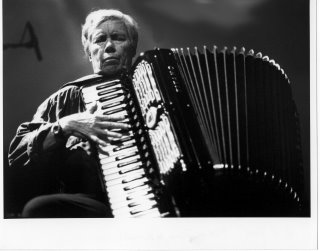
I suscribe to eMusic and highly recommend it to anyone whose musical taste extends beyond the the Top 40/Classic Rock spectrum and doesn't mind missing out on old-fashioned niceities like album covers and liner notes. (Okay, I miss those, but what can you do?) I usually use to to catch up with recent indie rock I missed the first time around, fill out blank spots from the Sun Records and Riverside jazz catalog. There's an abundance of great '50s and '60s jazz there. And probably beyond those decades, but jazz kind of loses me after Bitches Brew. For your jazz flute needs, I recommend the Herbie Mann album Flute Souffle.
But I digress. What I really wanted to write about was how it's the dream destination for anyone who's curious and frugal. There's a ton of experimental 20th century music on there that. And thanks to the way eMusic's structure, every track downloaded counts the same against users' monthly download allowance, regardless of length. So say you want Bang On A Can's 45-minute rendition of Terry Riley's "In C" composition (and you should; it's disorientingly lovely), that's just one track. Lately I've been picking through the the work of Pauline Oliveros, an accordionist/early electronic musician who experimented with tape loops and primitive synths and later pioneered a theory of "deep listening" and music to accompany the theory that challenged listeners to treat the environment around them as a musical landscape. Also, there's some business withb mandalas to it that I don't really understand, but it's mind-bending stuff nonetheless. I'm tempted by a John Cage title called Empty Words (part III). It's a two-disc, two-track set of him reading a Thoreau essay, stretching out the syllables until they stop working as language while, as per his intent, the audience turns on him. But not that tempted.
***
Otherwise I've mostly been listening to stuff covered in Simon Reynolds fairly essential new book Rip It Up And Start Again: Postpunk 1978-1984, which suggests that Public Image Limited was more important than the Sex Pistols and other heretical notions. It's given me a better appreciation of some old favorites (Talking Heads), deepened my understanding of groups I've always respected more than enjoyed (Gang Of Four), and made me curious about some acts I've never bothered with before (The Pop Group, Throbbing Gristle.) Recommended, for sure.


No comments:
Post a Comment